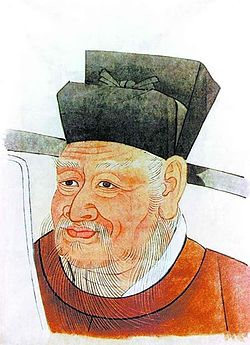
Back باو زهينج ARZ པའོ་ཀུང་། Tibetan Bău Cīng CDO Pao Čeng Czech Bao Zheng German Bao Zheng Spanish Bao Zheng French 包拯 GAN Pâu Chín HAK Bao Zheng ID
Justice Bao (包青天;pinyin: Bāo qīngtiān) Bao Zheng | |
|---|---|
包拯 | |
 | |
| Personal details | |
| Born | 5 March 999 Shenxian, Hefei, Luzhou, Northern Song dynasty |
| Died | 3 July 1062 (aged 63) Kaifeng(祥符區), Northern Song dynasty |
| Resting place | Baogong Cemetery, Luyang District, Hefei, Anhui, China 31°51′27.17″N 117°17′56.39″E / 31.8575472°N 117.2989972°E |
| Spouses |
|
| Domestic partner | Lady Sun (孙氏) |
| Children | |
| Parent |
|
| Education | Jinshi |
| Occupation | Politician & Imperial General Inspector |
| Known for | Chinese cultural personification of justice |
| Full name | Surname: Bāo (包) Given name: Zhěng (拯) Courtesy name: Xīrén (希仁) Posthumous name: Xiàosù (孝肅) |
| Other names |
|
| Bao Zheng | |||||||||||||||||||||||
|---|---|---|---|---|---|---|---|---|---|---|---|---|---|---|---|---|---|---|---|---|---|---|---|
| Chinese | 包拯 | ||||||||||||||||||||||
| |||||||||||||||||||||||

Bao Zheng (包拯; Bāo Zhěng; 5 March 999 – 3 July 1062), commonly known as Bao Gong (包公; Bāo Gōng; 'Lord Bao'), was a Chinese politician during the reign of Emperor Renzong in China's Song Dynasty. During his twenty-five years in civil service, Bao was known for his honesty and uprightness, with actions such as impeaching an uncle of Emperor Renzong's favourite concubine and punishing powerful families. His appointment from 1057 to 1058 as the prefect of Song's capital Kaifeng, where he initiated a number of changes to better hear the grievances of the people, made him a legendary figure. During his years in office, he gained the honorific title Justice Bao (Chinese: 包青天; pinyin: Bāo qīngtiān) due to his ability to defend peasants and commoners against corruption or injustice. Bao Zheng is depicted as the incarnation of the Astral God of Civil Arts (Wenquxing, 文曲星), while another protagonist — famous Northern Song warrior Di Qing as the Astral God of Military Arts (Wuquxing, 武曲星).[1]
Bao Zheng today is honored as the cultural symbol of justice in Chinese society. His largely fictionalized gong'an and wuxia stories have appeared in a variety of different literary and dramatic mediums (beginning with The Seven Heroes and Five Gallants), and have enjoyed sustained popularity. In mainstream Chinese mythology, he is often portrayed wearing a judge's zhanjiao futou hat and a crescent moon on his forehead. Some Chinese provinces later deified Judge Bao, equating him to the benevolent war god Guan Gong.
- ^ Idema, Wilt Lukas (23 December 2009). "Introduction to Judge Bao and the Rule of Law: Eight Ballad-Stories from the Period 1250-1450" (PDF). Social Science Research Network.
{{cite journal}}: Cite journal requires|journal=(help)
© MMXXIII Rich X Search. We shall prevail. All rights reserved. Rich X Search